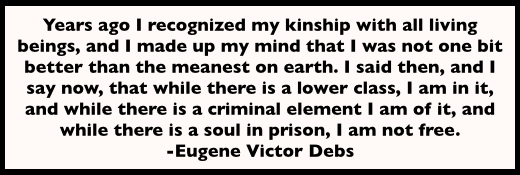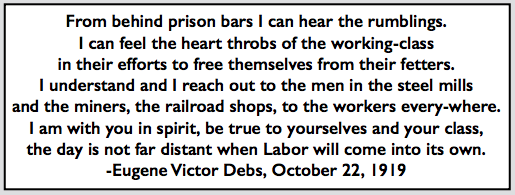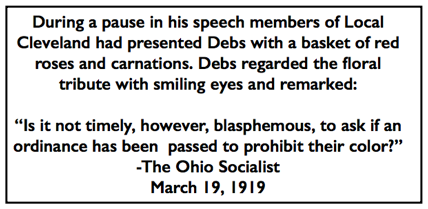
—————
Hellraisers Journal – Monday January 10, 1921
“Eugene” By Edmund Vance Cooke
(Written in the courtroom while Debs was being tried.)
From the Appeal to Reason of January 8, 1921:

—————
Hellraisers Journal – Monday January 10, 1921
“Eugene” By Edmund Vance Cooke
(Written in the courtroom while Debs was being tried.)
From the Appeal to Reason of January 8, 1921:
 ———-
———-
Hellraisers Journal – Thursday November 6, 1919
Eugene V. Debs: “Be true to yourselves and your class.”
From The Ohio Socialist of November 5, 1919:
Cincinnati O. Oct. 23. 1919.
DEAR COMRADE WAGENKNECHT:-
I visited Gene yesterday accompanied by attorney Castelton [Samuel Castleton] and found slightly improved, he is still in the hospital and will in all probability remain there because of his health. He is no longer obliged to work in the clothing shop as the Warden recognized he must get better air and rest. Every one about the prison appreciates and loves “our Gene,” many prisoners would gladly serve his time for him if they could. The prisoners in the tuberculosis section raise flowers and frequently send him boquets.
He is cheerful and optimistic, the split in the Party is to him an evidence of growth. He said,
Parties will split, but the movement for working-class emancipation never splits, the rank and file in all the Parties are honest and will get together in their own good time.
Tell them to carry on the work for liberation of all political prisoners. All of us will be released when the working-class present a united front. We must see to it that the financial interests are not permitted to overthrow by force the liberties so dearly bought and paid for by the blood of the workers.
 ———-
———-
Hellraisers Journal – Tuesday August 19, 1919
Atlanta Federal Penitentiary – Prisoner Debs Welcomes President Wilson Home
From The Ohio Socialist of August 6, 1919:
 ———-
———-
Hellraisers Journal – Sunday June 8, 1919
May Day Celebrated at Ft. Leavenworth by Reds of All Stripes
From The Liberator of June 1919:
May Day in Ft. Leavenworth
By a Socialist C. O.
WHILE Cleveland was having its fatal May Day demonstration and while other free American cities were engaged in bloody rioting and fighting between citizens and police, with soldiers pitching in on both sides and shavetail ex-officers going into “action” for the first time, the militant Socialists imprisoned in Fort Leavenworth were observing the international revolutionary Labor Day under U. S. military sanction.
The open air red flag parade was witnessed by a crowd of soldiers who offered no opposition but viewed it with apparent approbation. The one day stoppage of prison work by the celebrants met with the approval in advance of the prison authorities who made special arrangements to permit the rebel group to assemble and observe the day. Civilians and Q. M. sergeants and children on their way to school looked with amazement on the unprecedented prison scene as it unfolded itself behind the double lines of barbed wire surrounding the stockade-annex of the Disciplinary Barracks.
 ———-
———-
Hellraisers Journal – Thursday May 1, 1919
For May Day of 1919: “A Better World’s in Birth”
From The Ohio Socialist of April 23, 1919:
 ———-
———-
Hellraisers Journal – Sunday April 27, 1919
From Leavenworth Prison – Poetry of Charles Ashleigh and H. Austin Simons
The following three poems appeared in the Ohio Socialist of April 23, 1919. The first is by Fellow Worker Charles Ashleigh and the second is by H. Austin Simons, Conscientious Objector. The third is by Mary O’Reilly, Socialist of Chicago.
 ———-
———-
Hellraisers Journal – Thursday April 17, 1919
Moundsville, West Virginia – With Eugene Debs at West Virginia State Prison
From The Ohio Socialist of April 16, 1919:
Debs’ First Day In Prison
By DAVID KARSHNER [KARSNER].
Moundsville, W. Va., April 14.-Eugene Victor Debs will sleep tonight, not in a cage like a wild beast, as he slept last night, his first night in the West Virginia State Prison, but in a little room in the hospital of the prison, for “Our Gene” has been appointed a hospital attendant, and he has a separate room to himself, with a white iron bed, newly clothed, a table and a chair.
Shortly after 11 o’clock this morning Debs was taken from his cell, No. 51, in the second tier of the south wing, to the prison baths. He was examined by Dr. O. P. Wilson, the prison physician, and then donned prison underclothing and the prison uniform. But when I saw Debs late this afternoon the prison suit was not unbecoming to him. It was well fitting and contained the tiniest check. It is the kind of a suit that anybody might purchase at a cheap clothing store.
Warden Joseph Z. Terrill explained that he had at first thought of placing Debs in the prison library because of his knowledge of books and literature, but he did not do this because he thought that he might be too much subjected to curiosity. As hospital attendant Debs will have a rom entirely to himself. The room is of a good size, larger than most rooms of the Bronx apartments. It is on the ground floor. There are two ample windows one facing the south, and one the east. There are no bars at his windows. The door will be open at all times, and Debs has full privilege to come and go as he pleases. He has full and complete access to the prison yard and the lawns.
 ———-
———-
Hellraisers Journal – Saturday March 29, 1919
The History of the Seattle General Strike: Organization
From The Ohio Socialist of March 26, 1919:
THE SEATTLE GENERAL STRIKE
(HERE IS THE HISTORY OF THE SEATTLE GENERAL STRIKE
AS APPEARED IN THE SEATTLE UNION RECORD)
—–
Four days before the strike actually took place, the meetings of the General Strike Committee began. With their first session on Sunday, Feb. 2, 1919, authority over the strike passed from the Central Labor Council, which had sent out the call, and from the Metal Trades Council which had asked it, and was centered in a committee of over 300 members, elected from 110 local unions and the Central Labor Council, for the express purpose of managing the strike.
The first meeting was called in order at 8:35 in the morning and continued is session until 9:30 that evening, with short intermissions for meals. From this time on until the close of the strike, there were meetings daily and at almost all hours of day and night, of either this General Strike Committee, or of the Executive Committee of fifteen which it delegated some of its authority. The volume of business transacted was tremendous; practically every aspect of the city’s life came before the strike committee for some decision.
A general strike was seen, almost at once, to differ profoundly from any of the particular strikes with which the workers of Seattle were familiar. It was not enough, as some of the hasty enthusiasts declared, to “just walk out.” The strikers were at once brought face to face with the way in which the whole community, including their own families, is inextricably tied together. If life was not to be made unbearable for the strikers themselves, problems of management of selection and exemption had to take the place of the mush simpler problem of keeping everyone out of work.
 ———-
———-
Hellraisers Journal – Friday March 28, 1919
New York, New York – Defense Committee Statement on Persecution of I. W. W.
From The Ohio Socialist of March 26, 1919:
Defense Committee Tells of
Persecution of I. W. W.
—–
The New York Defense Committee of the I. W. W. has issued the following statement in regard to the government’s activities in persecuting that organization:
With the war-time prosecutions being pushed relentlessly by the U. S. government and with a fresh outburst of capitalist persecution everywhere […..against?] radical labor elements, the I. W. W. is being driven to redoubled efforts to raise the large sum needed to protect its members throughout the country and defend the right of the organization to carry on its work as a labor union.
The New York Defense Committee of the I. W. W. has been reorganized and has mapped out an energetic money-raising and publicity campaign. The labor organizations of New York and vicinity and radical groups and individuals throughout the country are going to be appealed to for help in meeting the financial demands of the situation.
The committee, in its appeal for the support of all friends of the radical labor movement, points to the fact that, in addition to 93 I. W. W.’s convicted in the famous Chicago trial last summer and sentenced to 807 years’ imprisonment and fined aggregating $2,570,000, 46 members were convicted last January in the Sacramento bomb frame-up. Besides there, 34 more are to be tried in Wichita this month, while 28 are still awaiting trial in Omaha and 27 in Spokane, in addition to scores of individual cases throughout the western states, either under the Espionage act or under state laws against “criminal syndicalism” enacted within the past year for the express purpose of crushing the I. W. W.
 ———-
———-
Hellraisers Journal – Friday March 21, 1919
Cleveland, Ohio – Eugene Debs Presented with Red Roses at Farewell Address
From The Ohio Socialist of March 19, 1919:
Eugene V. Debs’ Speech at West Side Turn Hall, Cleveland
[Wednesday Evening, March 12, 1919]
Before a capacity audience of 3,000 which filled West Side Turn hall one hour before his scheduled appearance Debs made his farewell speech.
Debs was calm, His opening words were accorded an instantaneous silence. He said:
How true it is that there is a divinity that shapes our ends, roughhew them how we will! It may seem strange to you, but in my plans, in my dreams, I did not think of going to the penitentiary-and I-I had a thousand times rather go there and spend my remaining days there than to betray this great cause.
So far as I am concerned it does not matter much. The margin is narrow, the years between now and the sunset are few, and the only care that I have personally is that I may preserve to the last the integrity of my own soul and my loyalty to the only cause worth living for, fighting for, and dying for.
It is so perfectly fine to me to look into your faces once more, to draw upon you for the only word I have ever had, the only word that I can ever speak for myself. I love mankind, humanity. Can you understand? I am sure you can.
We are close of kith and kin, we are human and when we get into close touch with each other we come to understand that our good depends upon the good of all humanity.
Opposed to System.
I am opposed to the system under which we live. I am opposed to the government that compels you, the great body of the American people, to pay your tribute to an insignificant few who enjoy life while the great body of the people suffer, struggle, and agonize without ever having lived. Can you understand? I am sure you can.
Let me get in touch with you for a while. I am going to speak to you as a Socialist, as a revolutionist, and, if you please, as a Bolshevist.
And what is the thing that the whole world is talking about? What is it that the ruling class power of the world are denouncing, upon which they are pouring a flood of all their malicious lies-what is it? It is the rise of the workers, the peasants, the soldiers, the common man, who for the first time in history said, “I have made what there is, I produced the wealth; I want to be heard.”